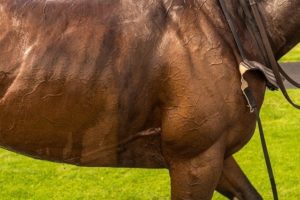Is sweating always a bad sign in racehorses?
 Generally speaking, sweating in racehorses is a good sign insofar as it helps to regulate body temperature. The evaporation of sweat, which is 90% water, creates a cooling effect, known as evaporative cooling, which lowers the body temperature. Of course, racehorses have a thick, waterproof, hairy coat, so their sweat contains a protein, known as latherin, which accelerates the transfer of sweat from the skin to the surface of the hair. When subject to friction, from girths, reins, etc, latherin can cause foaming, or lathering, of the sweat. Sweating can also reflect the physical condition of a racehorse. The fitter the horse, the better it becomes at regulating body temperature and the more readily it sweats.
Generally speaking, sweating in racehorses is a good sign insofar as it helps to regulate body temperature. The evaporation of sweat, which is 90% water, creates a cooling effect, known as evaporative cooling, which lowers the body temperature. Of course, racehorses have a thick, waterproof, hairy coat, so their sweat contains a protein, known as latherin, which accelerates the transfer of sweat from the skin to the surface of the hair. When subject to friction, from girths, reins, etc, latherin can cause foaming, or lathering, of the sweat. Sweating can also reflect the physical condition of a racehorse. The fitter the horse, the better it becomes at regulating body temperature and the more readily it sweats.
Of course, profuse sweating, particularly if accompanied by other poor behaviour, such as head tossing, rearing or tail swishing, before a race can also be a sign of agitation, excitability or irritation in a racehorse. A racehorse that displays such traits wastes nervous energy and is more likely to pull hard, wasting further energy, once the race is underway, resulting in poor performance. Some horses sweat more than others, even in cooler weather but, as a rule of thumb, any racehorse completely covered and/or dripping with sweat should be treated with caution as a betting proposition.